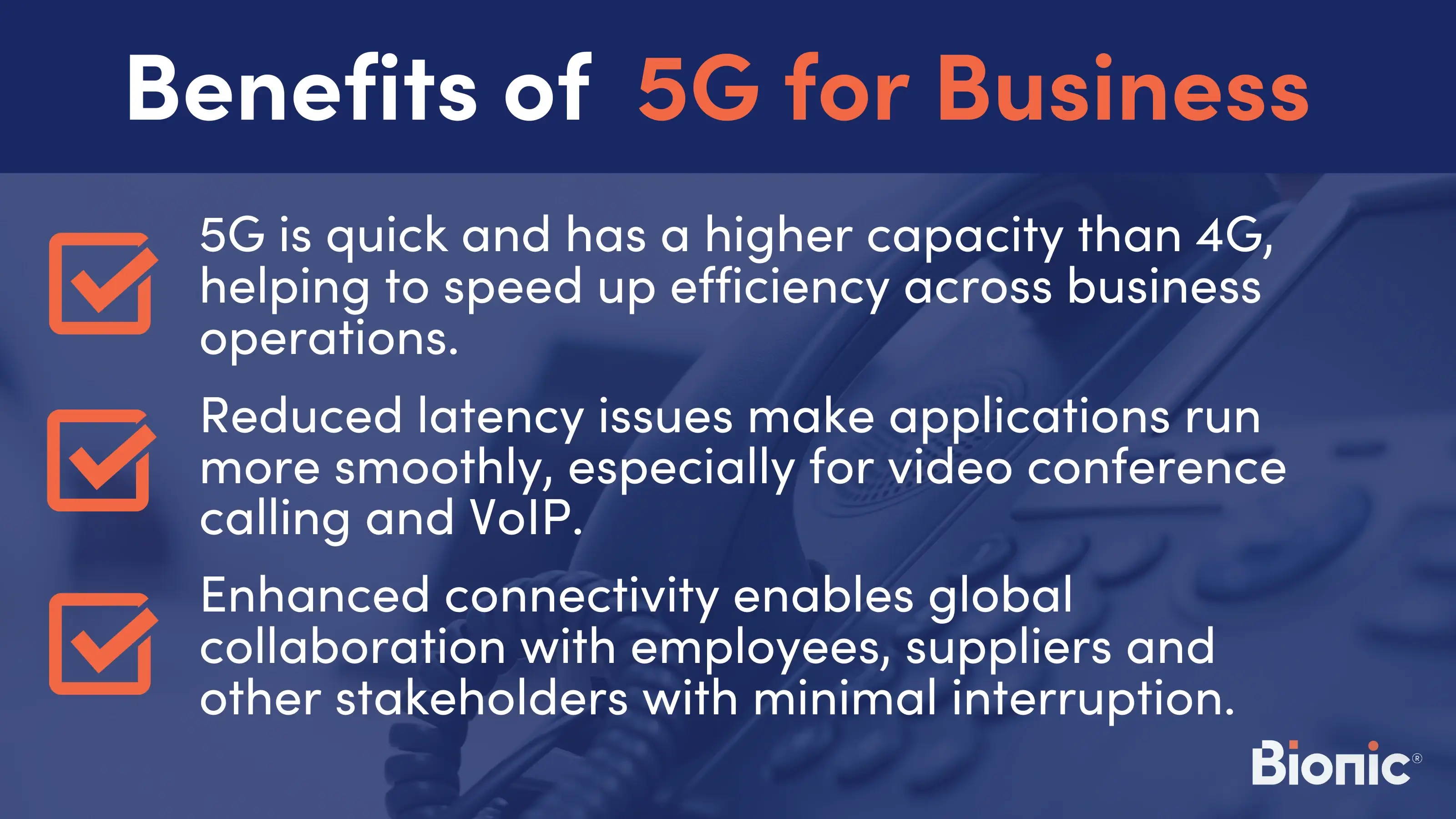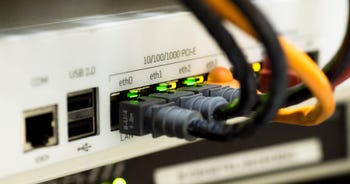What is 5G? Why should small businesses use it?
The digital switchover is fast approaching and any internet-based devices connected to a landline will stop working by the end of 2025. And one way to still keep your business online is using a 5G network.
50% of major UK towns and cities now have 5G coverage, making it more accessible than ever! And this technology has only just kicked off, so the possibilities are endless when it comes to how 5G can help improve efficiencies and customer experience in small businesses.
In this guide, we’ll get into the advantages and drawbacks of using 5G for business as well as digging into which business can benefit from it the most.
But first, back to the basics.

30 second summary
- 5G is faster and more efficient than previous networks like 4G and 3G as it runs on higher frequency waves. This makes it a great choice for business connectivity solutions where WiFi just isn't suitable.
- To use a private 5G network, you'll need 5G compatible equipment and devices, and as this technology is still in its infancy, you might find some technology is not readily available yet.
- 5G is fast, has reduced latency, better connectivity and a host of other benefits that small businesses can use to improve business operations.
- Like any new tech, 5G does have its limitations and might not be suitable in built-up areas as coverage may not be perfect. Intensive use may lead to high energy consumption too, that's why businesses should do their research before committing to using 5G.
- 5G might not be a viable option for all - but it can be part of innovative solutions for businesses that heavily use the Internet of Things (IoT), especially in the healthcare, industrial and hospitality sectors.
What is 5G technology?
5G is the fifth generation of mobile networks, after 4G, and it’s the latest technology for wireless communication. It can be used with mobiles, computers, machines and any device that can connect to a network.
It’s fast, has better upload and download speeds, and can connect to more devices, increasing its network capacity. Overall, a 5G connection provides a better experience than older technologies like 4G and 3G.
When was 5G introduced, and why?
5G technology has been rolled out in the UK since 2019 but emerged in the early 2010s. New technology and an increase in data-drinking devices like smartphones and tablets have led to a need for a faster, more effective network. 5G was developed to cope with this surge in demand and is considered to help solve connectivity issues for the Internet of Things (IoT).
5G is now used widely for business connectivity solutions, including mobile broadband, which is an option for wireless devices across your business that aren’t connected to WiFI or MiFi.
How does 5G work, and will my business require any other infrastructure?
The basics of 5G are relatively the same as previous networks like 4G, but it uses higher radio frequencies to transmit information. These are called millimeter waves (mmWaves) and this means it can transfer data faster than other networks on lower-frequency radio waves.
If you’re a business wishing to use a 5G mobile connection for employee devices, then you’ll need to make sure your mobile business network offers it. 5G is the fastest mobile connection, with average download speeds between 75-238 Mbps. However, you’ll only benefit from these speeds if you’re business is situated in an area with a strong 5G signal.
You’ll also need to make sure your mobile devices and tablets are compatible to use with 5G. To check this, on your device settings go to ‘network settings’ and check your ‘preferred network type’ — if you see 5G listed then it is compatible. If you are unable to check your network settings in the device itself, you may be able to check them on the manufacturer’s website, under your device specifications.
What are the benefits of 5G?

There are many reasons why businesses should use a 5G connection over a 4G or other lower-band network. These include:
Increased speed and efficiency
5G is quick and has a much higher capacity than 4G — so connected devices work faster. This can help speed up business efficiency across operations such as faster payments on tablets or stronger mobile internet for employees who are ‘on-the-go’. And for large industrial businesses, a 5G network could even be used to help increase the operational productivity of machinery.
Reduced latency issues
Reduced latency refers to a reduction in time for data to be transmitted. This helps mobile applications run more efficiently, especially those that need quick response times like video conference calling, VoIP calling, instant messaging applications and other online collaboration systems that you might use in an office environment.
Enhanced connectivity
Because of the high-performance nature of 5G, you can collaborate and work with employees, suppliers and other stakeholders across the globe, with minimal interruption. This is great for businesses that operate globally, have travelling employees who still need to work abroad or remote workers who need to be connected. It also allows for more reliable web browsing, which can greatly improve workflow in office environments.
Improved reliability
If you are using 5G in an area with a strong network then it should have a more reliable connection than if you were using 4G or 3G. Although this can vary between countries and regions, it also depends on local infrastructure. If you are in a built-up area, you may experience some frequent dropouts.
Chance for new business innovations
Businesses can upgrade operational equipment to work with wireless connections. For example, digital appliances, security cameras and waste management systems. These devices may be able to provide real-time data on usage patterns that can be used to optimise business operations, make things work faster and increase your bottom line.
For example, imagine you own a warehouse of goods and want to make your inventory tracking and logistics process easier. Using a 5G network with truck devices linked up to the cloud, you could check stock levels and move goods around your warehouse. It could also analyse incoming data in real-time so staff can respond to situations like checking where stock is or if there is any misplaced.
What are the challenges of using 5G technology?
Although 5G technology can improve how small businesses run, like anything, they also have some setbacks which are worth considering before you invest.
Infrastructure investment
Depending on what network you use across your business — moving from 4G to 5G can be a bit of a hassle, especially if your operations are large and your existing infrastructure runs on a lower network. Updating it will require an overhaul as not all equipment will be compatible and you may need some specialist help installing additional equipment that could be costly.
Limited coverage
One of the main issues with 5G networks is that the coverage can be limited in built-up areas. If your business is situated in a crowded city with high-rise buildings, you may run into connection problems. Because 5G runs on a higher network, it has limited ability to get through building walls. If you test 5G and run into coverage problems, it might be worth sticking to using a 4G network, as this tends to work better indoors.
Compatibility and upgrade costs
You might also find you want to upgrade to 5G, but the equipment you need may not be 5G ready and available to work with a 5G network. This technology is still in its early stages, so many manufacturers may not have 5G-compatible versions of IoT devices. In this case, you should hang on a few years until you can get your hands on the latest upgrade!
Possible higher energy consumption
Although 5G uses less energy per Kilowat than 4G, the amount of data used is considerably more. So the total amount of energy you are using is probably a lot higher overall, and this can contribute to higher electricity bills. If you are having an infrastructure overhaul - it might be worth considering self-generated electricity solutions to try and offset the amount of extra energy you could be using.
Learn more about average business energy consumption in our guide.
Security risks
Networks pose security risks. And because 5G runs on some of the infrastructure built for 4G, it already has some vulnerabilities in the network that put it at risk of hackers. It’s not just the network that could be infiltrated, physically, it could also be at risk. Cellular towers built in your area could be attacked, and the devices your employees are using could be hacked.
There are ways you can protect your business and your employees from unwanted snoopers by staying clued up on what to watch out for in case you face a cyber attack. Read more in our complete guide to hacking.
How can businesses prepare for the transition to 5G?
- Develop a 5G strategy - Spend some time thinking about how 5G could solve some business problems — better communication with your customers, for example. Then look at your day-to-day business operations and see what might need to change if you decide to adopt 5G tech. You might need to consider the investment you might have to make too.
- Assess and update infrastructure if needed - If your business operations are complex, you might have multiple warehouses, for example. You’ll need to consider updates to your business infrastructure to make it 5G capable — like changing the layout of your warehouse or redoing your processes.
- Invest in compatible devices and technology - It’s time to get your business 5G ready! You might need to invest in or update your cloud solutions as well as devices and put any extra secure measures in place. Every business is different, so technology will differ, but it’s important not to miss this step as old devices may not work with a 5G network.
- Train employees on new technology and ways of working - If you’ve changed processes and invested in new devices, then it’s key to train your staff on how to work efficiently using them. You might have new tablets for taking orders in a cafe or other new ways of working, for example. Some basic training on how to use this will make sure your staff are confident and get to work with a stride in their step.
When might a business need a 5G connection?
Some businesses might be better suited to using an internal 5G network than others based on their nature. Here are a few examples of when using a 5G might be a good option:
- Remote workers - If you have remote employees or staff working abroad or even in different locations. It might pay off to have a 5G mobile broadband network that they can tap into wherever they are.
- Rural areas - If your business is out in the countryside and is spread across lots of land — like a farm, for example. You might not be able to get a reliable WiFi connection using business broadband. Instead, you could invest in a 5G private network to connect your machinery. The 5G RuralDorest project shows just how you can increase business productivity in rural areas of the country with 5G technology.
- Logistical improvements - Businesses that use a lot of IoTs can run into a logistical nightmare and might benefit from adopting a central 5G network. This would be connected to software on the cloud to monitor and run business activities.
- Office buildings - Office buildings can be smart and use building management systems with smart locks on entrances and automation alarms, lifts and other technology for better security and efficiency. These can work linked up to a private 5G network.
What future innovations can businesses expect to see with 5G?
Uses for 5G are evolving constantly! New 5G-enabled virtual and augmented reality has the potential to be used in businesses in multiple industries like manufacturing, industrial, automotive and even in healthcare settings.
The future looks bright for bright employees, too as more businesses adopt 5G, employees will need to be tech-savvy, making way for a better-skilled workforce!
Should I use 5G or fibre optic broadband for my business connection?
This really depends on what your individual business needs are. But it’s worth considering the points outlined below:
- Fibre optic broadband is generally quicker than 5G (always check your area for broadband speeds)
- 5G can offer a bigger network geographically, while WiFi is limited within a certain area
- If you operate in a built-up area, you might have issues with 5G coverage, in this case, it might be better to use a fibre broadband connection.
- If you have a VoIP phone system, it can still work over a 5G system, but it might be unreliable compared to a fibre broadband connection.
Ultimately there are several options for business connectivity, including leased line broadband, FTTC, FTTP and mobile broadband. Carefully considering the needs of your business and weighing up the options will help you decide what’s best.
Get your business set with Bionic
If you need support in deciding if 5G is right for your business, get in touch with our team here at Bionic, who can help advise on many business connectivity solutions, including broadband and digital VoIP services that integrate with the cloud. Interested in more connectivity content? Head to our guides for some more reading on the cloud, wifi, broadband and more.





